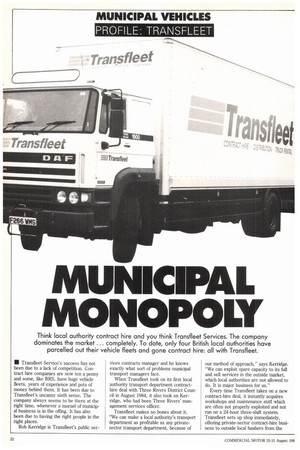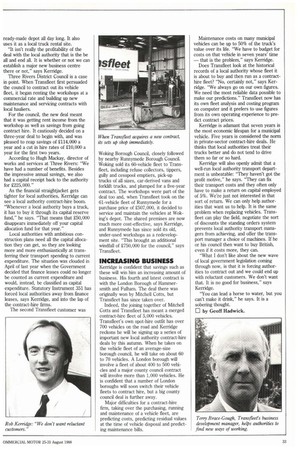MUNICIPAL MONOPOLY
Page 30

Page 31

If you've noticed an error in this article please click here to report it so we can fix it.
Think local authority contract hire and you think Transfleet Services. The company dominates the market ... completely. To date, only four British local authorities have parcelled out their vehicle fleets and gone contract hire: all with Transfleet.
• Transfleet Service's success has not been due to a lack of competition. Contract hire companies are now ten a penny and some, like BRS, have huge vehicle fleets, years of experience and pots of money behind them. It has been due to Transfleet's uncanny sixth sense. The company always seems to be there at the right time, whenever a morsel of municipal business is in the offing. It has also been due to having the right people in the right places.
Rob Kerridge is Transfleet's public ser vices contracts manager and he knows exactly what sort of problems municipal transport managers face.
When Transfleet took on its first local authority transport department contracthire deal with Three Rivers District Council in August 1984, it also took on Kerridge, who had been Three Rivers' management services officer.
Transfleet makes no bones about it. "We can make a local authority's transport department as profitable as any privatesector transport department, because of our method of approach," says Kerridge. "We can exploit spare capacity to its full and sell services in the outside market, which local authorities are not allowed to do. It is major business for us."
Every time Transfleet takes on a new contract-hire deal, it instantly acquires workshops and maintenance staff which are often not properly exploited and not run on a 24-hour three-shift system. Transfleet sets up shop immediately, offering private-sector contract-hire business to outside local hauliers from the
ready-made depot all day long. It also uses it as a local truck rental site.
"It isn't really the profitability of the deal with the local authority that is the be all and end all. It is whether or not we can establish a major new business centre there or not," says Kerridge.
Three Rivers District Council is a case in point. When Transfleet first persuaded the council to contract out its vehicle fleet, it began renting the workshops at a commercial rate and building up new maintenance and servicing contracts with local hauliers.
For the council, the new deal meant that it was getting rent income from the workshop as well as savings from going contract hire. It cautiously decided on a three-year deal to begin with, and was pleased to reap savings of 2114,000 a year and a cut in hire rates of 210,000 a year for the first two years.
According to Hugh Mackay, director of works and services at Three Rivers: "We have had a number of benefits. Besides the impressive annual savings, we also had a capital receipt back to the authority for 2225,000."
As the financial straightjacket gets tighter for local authorities, Kerridge can see a local authority contract-hire boom. "Whenever a local authority buys a truck, it has to buy it through its capital reserve fund," he says. "That means that 250,000 disappears immediately off your capital allocation fund for that year."
Local authorities with ambitious construction plans need all the capital allocation they can get, so they are looking more and more enthusiastically at transferring their transport spending to current expenditure. The situation was clouded in April of last year when the Government decided that finance leases could no longer be counted as current expenditure and would, instead, be classified as capital expenditure. Statutory Instrument 351 has forced local authorities away from finance leases, says Kerridge, and into the lap of the contract-hire firms.
The second Transfleet customer was Woking Borough Council, closely followed by nearby Runnymede Borough Council. Woking sold its 60-vehicle fleet to Transfleet, including refuse collectors, tippers, gully and cesspool emptiers, pick-up trucks of all sizes, car-derived vans and forklift trucks, and plumped for a five-year contract. The workshops were part of the deal too and, when Transfleet took on the 61-vehicle fleet of Runnymede for a purchase price of 2507,000, it decided to service and maintain the vehicles at Woking's depot. The shared premises are now much more cost-effective, says Kerridge, and Runnymede has since sold its old, under-used workshops as a redevelopment site. "This brought an additional windfall of .2750,000 for the council," says Transfleet.
INCREASING BUSINESS
Kerridge is confident that savings such as these will win him an increasing amount of business. His fourth and latest contract is with the London Borough of Hammersmith and Fulham. The deal there was originally won by Mitchell Cotts, but Transfleet has since taken over.
Indeed, the joining together of Mitchell Cotts and Transfleet has meant a merged contract-hire fleet of 5,000 vehicles. Transfleet's own spot-hire outfit has over 700 vehicles on the road and Kerridge reckons he will be signing up a series of important new local authority contract-hire deals by this autumn. When he takes on the vehicle fleet of an average-size borough council, he will take on about 60 to 70 vehicles. A London borough will involve a fleet of about 400 to 500 vehicles and a major county council contract will involve more than 1,000 vehicles. He is confident that a number of London boroughs will soon switch their vehicle fleets to contract hire, but a big county council deal is further away.
Major difficulties for a contract-hire firm, taking over the purchasing, running and maintenance of a vehicle fleet, are predicting costs, predicting residual values at the time of vehicle disposal and predicting maintenance bills. Maintenance costs on many municipal vehicles can be up to 50% of the truck's value over its life. "We have to budget for costs on that vehicle in seven years' time — that is the problem," says Kerridge.
Does Transfleet look at the historical records of a local authority whose fleet it is about to buy and then run as a contracthire fleet? "No, certainly not," says Kerridge. "We always go on our own figures. We need the most reliable data possible to make our predictions." Transfleet now has its own fleet analysis and costing program on computer and it prefers to use figures from its own operating experience to predict contract prices.
Kerridge is adamant that seven years is the most economic lifespan for a municipal vehicle. Five years is considered the norm in private-sector contract-hire deals. He thinks that local authorities treat their trucks better and do not tend to drive them so far or so hard.
Kerridge will also openly admit that a well-run local authority transport department is unbeatable: "They haven't got the profit motive," he says. "They can fix their transport costs and they often only have to make a return on capital employed of 5%. We're just not interested in that sort of return. We can only help authorities that want us to help. It is the same problem when replacing vehicles. Transfleet can play the field, negotiate the sort of discounts the standing orders system prevents local authority transport managers from achieving, and offer the transport manager a choice of machines. If he or his council then want to buy British, even if it costs more, they can.
"What I don't like about the new wave of local government legislation coming through now, is that it is forcing authorities to contract out and we could end up with reluctant customers. We don't want that. It is no good for business," says Kerridge.
"You can lead a horse to water, but you can't make it drink," he says. It is a sobering thought.
D by Geoff Hadwick.
























































